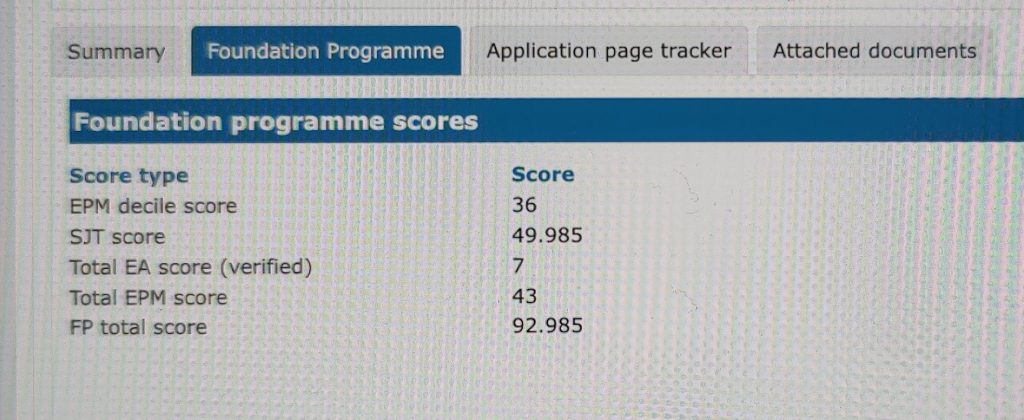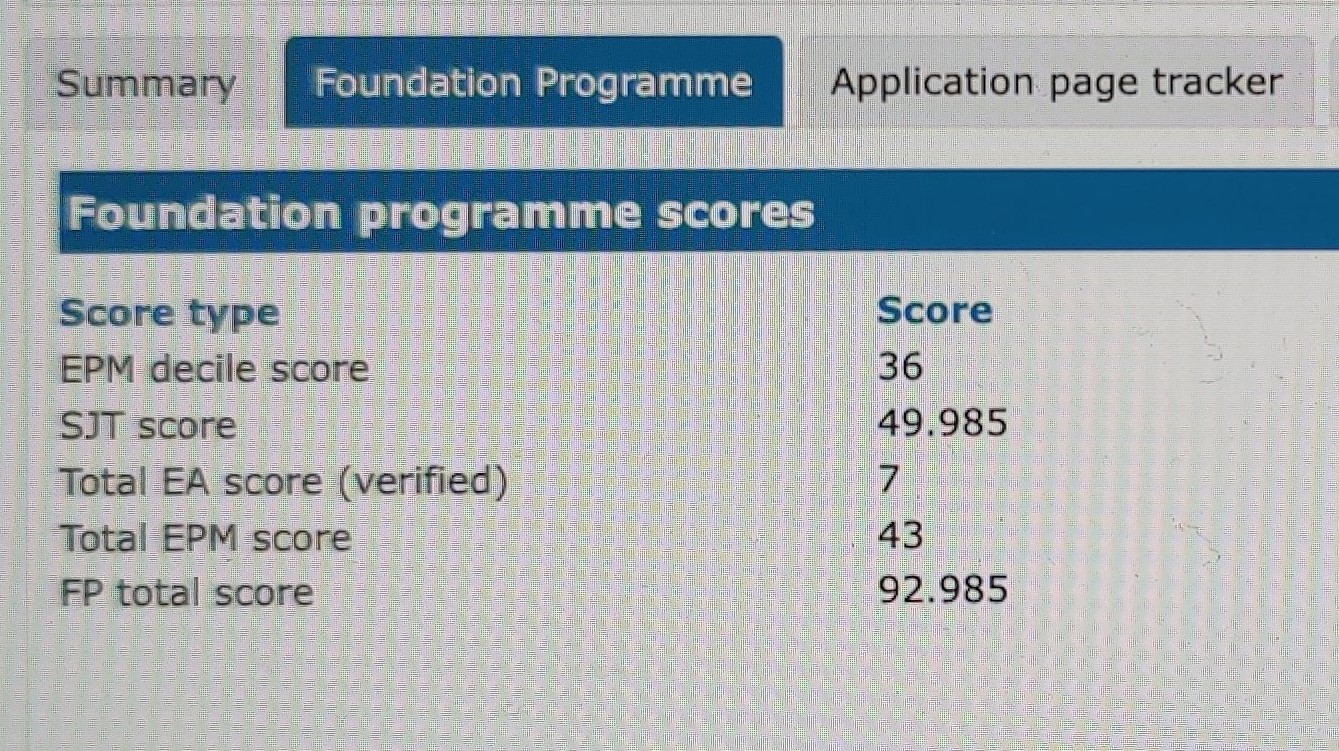The Foundation Situational Judgement Test (SJT) is an exam that medical students sit in their final year in order to appply to the UK Foundation Programme. Catrin Sohrabi, who scored 49.985 in the SJT (putting her in the top 0.5% of applicants), shares how she prepared for the SJT and tips for those starting their SJT preparation.

The Situational Judgement Test comprises approximately 50% of a student’s final score when applying to the UK Foundation Programme. This final score also includes your Education Performance Measure (EPM) which is calculated based on your performance at medical school. While the EPM ranges from 34 to 43, the SJT ranges from 0 to 50 marks. From FP 2023 entry onwards, the additional achievements part of the EPM score will be removed, with the EPM score being based only on your medical school decile – so the EPM will range from 43-50. Since the SJT is therefore so heavily weighted, it can significantly influence whether you get your first-choice deanery or not. Whilst you can’t cram for the SJT, there’s lots that can be done to prepare.
How to prepare for the SJT
The SJT is not a test of your clinical knowledge, but rather one that is used to determine whether you have the attributes required of a Foundation Programme trainee in the UK. Therefore, you can’t study for the SJT as you normally would do for any other medical school exam. Instead, you need to understand the general principles behind how and why decisions are made, how to ensure patient confidentiality, how to escalate appropriately, and how to resolve conflicts. Here are some resources that I found helpful and that I would highly recommend using as part of your SJT preparation.
UKFPO website and past papers
Access the official UKFPO past papers early on in your preparation. I would recommend completing at least one past paper with no prior SJT revision or knowledge just to get an idea of your baseline score and current understanding. Once done, complete the remaining papers and study the rationale for each question. Importantly, compare these against what the official GMC Good Medical Practice ethical guidance states. If you feel stuck, discuss the question with a friend to help pinpoint the key aspects of the scenario that are likely to influence the answer choice.

GMC Good Medical Practice
Ensure that you have a good understanding of the core material of the GMC’s Good Medical Practice ethical guidance. When completing mock SJT questions, compare the correct answer to what is stated in the GMC guidelines. Importantly, you must understand capacity, the ethical pillars of medicine and clinical practice, consent, and other important ethical principles.
Emedica SJT preparation course
The Emedica SJT preparation course is a 1-day interactive event that provides extensive information on how to tackle the SJT plus access to the Emedica SJT questions and mock exam – complete with full explanations, and presentation booklet. This course will provide you with useful techniques that can be applied to each section of the SJT and common traps that should be avoided when answering questions. This course supplemented my knowledge and really boosted my overall confidence with the SJT.
Passmedicine
In addition to the Emedica SJT preparation course I used an existing online Passmedicine subscription to supplement my SJT revision. This platform provides a good question bank with detailed explanations alongside a comments section which students can contribute to when discussing answers. Most students will have a subscription to this as part of their medical school finals revision, and so having access to the SJT section is an extra bonus.
To help you manage your preparation and improve your exam technique, I would suggest:
Prepare early
Preparation is key to success. It is important that you have a good understanding of the format and structure of the SJT, how to approach questions in a systematic and logical manner, and how to stick to timing well to ensure the completion of all questions. Since this is such a high stakes exam, ensure that you start a minimum of 1 month before your test date.

Group questions together in specific categories
I found it helpful to group questions from the official UKFPO past papers together. This would allow me to practice multiple questions from a specific group together. For example, questions relating to antibiotic prescribing were grouped, as was questions relating to patient confidentiality. This made it much easier for me to reinforce learning points from the GMC.
Practice on a computer
I would highly recommend practicing past papers on a computer screen since the official SJT exam will be sat on a computer too. This will allow you to become familiar with the online options and on-screen buttons, how to navigate to new and previous questions, how to flag questions, and how the general layout of the exam will be. This will hopefully make you feel more at ease on the day of your exam.
Practice timing
Timing is key in the SJT. Even if you are rushed for time towards the middle or end, having a go at all questions is significantly better than spending too much time on only a few questions at the start and then having to leave the rest unanswered. I found the Emedica SJT preparation course particularly helpful for this, since it provided extensive guidance on how long to spend on each section of the SJT. In general, be strict with yourself on how much time you are willing to spend per question when practising. Once that time is up, make an educated guess, flag the question, and move on. If you have time at the end of the exam, come back and have another go.
Think in terms of what would happen in the real world – place yourself in the scenario
When answering questions, I found it helpful to imagine myself in the actual question scenario. I would then ask myself – are any of these answer choices something that would be a reasonable option? Would it create further problems? Would it solve the actual problem? Spending time on the wards will also improve your decision-making skills by making you more familiar with possible SJT scenarios.

Read the question before reading the scenario
I personally found it helpful to read the question before reading the actual SJT scenario. Often, these scenarios can contain a lot of information and so it can be helpful to have an idea of what you are looking for before taking this on. Once you’ve completed the scenario, read the question again, and then select the most appropriate option.
The FPAS process as a whole
Regarding the entire FPAS process, it’s important to have a good idea of how competitive the deanery you want to go to is. For example, if you’re hoping to secure a foundation programme job in a deanery that is notorious for having very high FPAS and SJT cut off scores, then you’ll want to dedicate quite a bit of your time to SJT preparation in order to help boost your overall score and ranking.
Top tips for the SJT
- Start preparing early for the SJT!
- Complete all official UKFPO past papers and become familiar with the GMC Good Medical Practice ethical guidance.
- When addressing an SJT question, think to yourself – what would an actual F1 doctor do in this scenario?
- Read the question both before and after reading the clinical scenario.
- Try not to overthink! Usually, your first answer is the correct one.
Good luck!
Catrin Sohrabi





No Comments